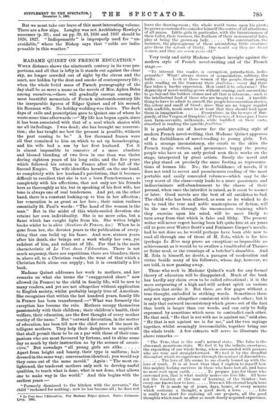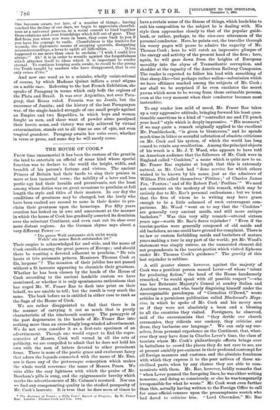MADAME QTJINET ON FRENCH EDUCATION.* WHEN distance shows the nineteenth
century in its true pro- portions, and all that is lofty in it stands out against the clear sky, no longer crowded out of sight by the circus and the mart, nor hidden by the dust and smoke of contemporary life ; when the whole fcetid mass of French pornography of the day shall be as mere a name as the novels of Mrs. Aphra Behn among ourselves,—there will gradually emerge among the most beautiful memorials of French nineteenth-century life the inseparable figures of Edgar Quinet and of his second, his Rouman wife. No holiday wedding was theirs. The dark days of exile and proscription gave to Quinet one of whom he wrote some time afterwards :—" My life has begun again, since it has been associated with that of a soul which shares with me all its feelings. I was dead; she has brought me resurrec- tion; she has taught me how the present is possible, without the past ceasing to be." A few thousand franca were all that remained to him on which to set up housekeeping, and his wife had a son by her first husband. Yet it is almost impossible to conceive of a more absolute and blessed blending of two lives in one than was theirs during eighteen years of his long exile, and the five years which followed his return to France after the fall of the Second Empire. The wife identifies herself, on the one hand, so completely with her husband's patriotism, that it becomes difficult to recollect that she is not a born Frenchwoman ; so completely with his affections, that not only are his friends hers as thoroughly as his, but in speaking of his first wife, her tone is always one of real tenderness. And yet, on the other hand, there is a constant looking-up to him in her affection ; her veneration is as great as her love ; their union realises essentially St. Paul's words : " The head of the woman is the man." But in the midst of this whole-souled devotion she retains her own individuality. She is no mere echo, but a flame which has caught light from his. She writes bright books whilst he is alive (Sentiers de France, &c.) When he is gone from her, she devotes years to the publication of every- thing that can build up his fame. And now, sixteen years after his death, she brings out a work wholly her own, yet redolent of him, and redolent of life. For that is the main characteristic of Le Vrai dans l' klucation. There is not much sequency, there are repetitions, there are blunders, there is, above all, to a Christian reader, the want of that which a Christian faith alone can supply ; but it is essentially a live book.
Madame Quinet addresses her work to mothers, and her remarks on what she terms the "exaggerated share" now allowed (in France) to the child in family life, will be new to many readers, and yet are not altogether without application to English society, whilst probably largely true of American. She recognises that within the last hundred years, family life in France has been transformed :—" What was formerly the exception has become the rule. Mothers occupy themselves passionately with their children; their children's health, their welfare, their education, are the first thought of every mother worthy of the name." But " outward decoration, in the matter of education, has been till now the chief care of the most in- telligent mothers. They help their daughters to acquire all that shall permit them to be on a par with those of their com- panions who are most favoured by fortune, and to shine some day as much by their instruction as by the science of savoir-
vivre." But nowadays " all young girls are alike Apart from height and beauty, their type is uniform ; hair dressed in the same way; conversation identical; you would say they came out of the same mould." Again : " The most en- lightened, the tenderest mothers only seek to develop useful qualities, to teach what is done, what is not done, what allows one to make way in the world." And this begins with the earliest years :—
" Formerly dismissed to the kitchen with the servants," the child " reckoned for nothing ; now he has become all ; he does not • Le Vrai dans VEdneatim Par Madame Edgar Qninet. Paris: Calmann• LtSvy. 1891. leave the drawing-room ; the whole world turns upon his pivot ; he grows accustomed to consider himself the centre of all attentions, of all praise. Little girls in particular, with the luxuriousness of their toilet, their tournure, the feathers of their monumental hats,
play at being the grown-up lady The conversation, the manners, the physiognomy of these astonishing little creature' give them the aplomb of thirty. One would say they are dwarf women, and they are seven years old."
Very truly and nobly Madame Quinet inveighs against the
modern style of French novel-writing and of the French stage:—
"To interest the reader, is corruption, putrefaction, indis- pensable? What ! always stories of assassination, robbery, the
hulks Look at those women of the people, those young girls reading on the tramway their feuilicion ; every day their face takes a harder expression. How could it be otherwise ? The depravity of novel-writing grows without ceasing, each one seeking to go beyond the boldest crimes and all that is infamous,--such is the intellectual food of those who are taught to read. A terrible thing to have to admit to oneself, the people love execution stories, the colour and smell of blood ; since they are no longer regaled with scaffolds, needs must be at least that they should feed upon them in imagination Everywhere, in the by ways of Bur- gundy, of the Vosges, of Dauphin6, of Provence, of Auvergne, I have seen farm-servants, milkmaids, while huddled on their carts, absorbed in reading the ignoble/cud/don."
It is probably out of horror for the prevailing style of modern French novel-writing, that Madame Quinet approves of the forbiddance of novel-reading to young girls. Yet. with a strange inconsistency, she extols to the skies the French tragic writers, and pronounces happy the young people who have at an early period seen their works on the stage, interpreted by great artists. Surely the novel and the play stand on precisely the same footing as representa- tions of human life. No ; the forbiddance of novels, if it does not tend to secret and promiscuous reading of the most portable and easily concealed volumes—which may be the
very worst of the class—only leads to a more passionate and indiscriminate self-abandonment to the charm of their perusal, when once the interdict is raised, as it must be sooner
or later. Good novels are the best of all antidotes to bad. The child who has been allowed, as soon as he wished to do so, to read the true and noble masterpieces of fiction, will be the one who, through the unconscious training which they exercise upon his mind, will be most likely to turn away from that which is false and filthy. The present writer will never regret having been left quite free at six years old to pore over Walter Scott's and Fenimore Cooper's novels ; had he not done so, he would perhaps have been able now to read all through one of those of M. Zola, which is for bin; (perhaps Le Rive may prove an exception) as impossible an
achievement as it would be to swallow a tumblerful of Thames or Seine mud, or the runnings of a butcher's shambles. And M. Zola is himself, no doubt, a paragon of moderation and virtue beside many of his followers, whose day, however, we are told, is now passing away.
Those who seek in Madame Quinet's work for any formal theory of education will be disappointed. Much of the book has hardly any claim even to be called educational ; it is the mere outpouring of a high and still ardent spirit on various subjects that strike it. But there are few pages without a true thought, embodied in striking words. Sometimes these may not appear altogether consistent with each other ; but it is only that outward inconsistency which grows out of the fact that truth is larger than our words, and can only be fully
expressed by assertions which seem to contradict each other. He that said, " He that is not with me is against me," said also, " He that is not against me is for me," and the two sayings together, whilst seemingly irreconcilable, together bring out the whole truth. A few extracts will serve to illustrate the above remarks :-
" The True, that is the soul's natural state. The false is the abnormal, monstrous state. We feel it by the infinite sweetness, the expanding of our whole being, when surrounded with persona who are true and straightforward. We feel it by the dreadful discomfort which we experience through the contact of dissemblers.
The love of life seems to me closely bound up with the love of truth. It is at least thus that I explain to myself how this mighty feeling survives in those who have lost all, and have no more root upon earth To prepare joys for those who surround you, that is what mainly makes one love life. All have not the vocation of the man of learning, of the thinker ; but every one knows how to love Does not life eternal begin here below ? It is made up of years, days, hours, of every minute
which contains a thought, a good deed, a. love Life is really too short for realising all our projects, all the good thoughts which reach us after so much dearly acquired experience.
One becomes aware, too late, of a number of things ; having reached the decline of our days, we begin to appreciate cheerful- ness as a universal panacea, as a social cement to bind together those relations and even friendships which fell out of gear. They fled from you when you were in tears, they come back to you if you have the courage to smile. Cheerfulness is the lenitive for wounds, the diplomatic means of escaping quarrels, dissipating
misunderstandings, a lever to uplift all difficulties It has happened to me more than once to exclaim : I wish I could live always ! ' Ah ! it is in order to wrestle against the forgetfulness which attaches itself to ideas which it is important to render eternal. To continue keeping souls awake, to recall to the young the Truth taught by masters who have disappeared, that is our only raison d'être."
And now one word as to a mistake, wholly unintentional of course, by which Madame Quinet inflicts a cruel stigma on a noble race. Referring to the last French Exhibition, she speaks of Paraguay in terms which only befit the regions of the Plata and Brazil. It was over Argentina, not over Para- guay, that Rosas ruled. Francia was no Jesuit, but the successor of Jesuits ; and the history of the last Paraguayan war, of the single-handed struggle of one small people against an Empire and two Republics, in which boys and women fought as men, and sheer want of powder alone paralysed their heroic arms, and victory was only achieved by virtual extermination, stands out to all time as one of epic, not even tragical grandeur. Paraguay awaits her vates sacer, whether in verse or prose, and some day he will surely come.



















































 Previous page
Previous page